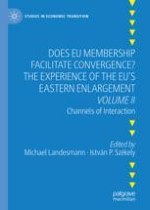2021 | OriginalPaper | Buchkapitel
3. FDI as Force of Convergence in the CESEE Countries
verfasst von : Septimiu Szabo, Jorge Durán Laguna
Erschienen in: Does EU Membership Facilitate Convergence? The Experience of the EU's Eastern Enlargement - Volume II
Aktivieren Sie unsere intelligente Suche, um passende Fachinhalte oder Patente zu finden.
Wählen Sie Textabschnitte aus um mit Künstlicher Intelligenz passenden Patente zu finden. powered by
Markieren Sie Textabschnitte, um KI-gestützt weitere passende Inhalte zu finden. powered by
